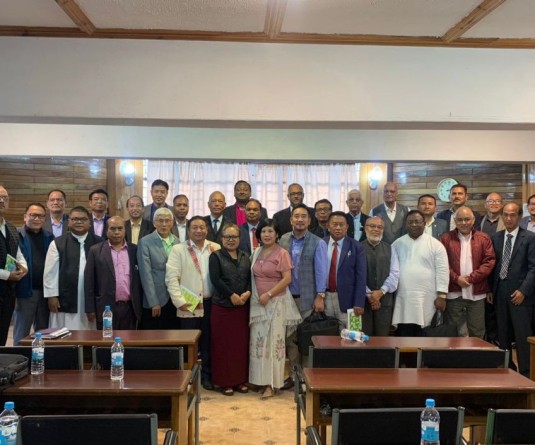
Apem Hongvah
Master Trainer Active Learner's Academy Dimapur
Communication plays a vital role in our life. There are various reasons why communication skills are important for students – it helps them in their study, to secure an interview, to advance in their career, to do their job well and of course for social networking etc. Communication can be categorized into three basic types namely: (i) verbal communication (ii) written communication (iii) Non-verbal.
Verbal communications in business take place over the phone or in person. The Medium of the message is oral - you listen to a person to understand their meaning and the message. Verbally, we all communicate, but how effective are we?
Effective communication takes place only if we speak clearly with correct pronunciation, and by listening actively. The English Language is now the Global Language in its true sense. English is a dynamic language and is always evolving in terms of increasing the lexical resources and their usages. Every Language has a set of sounds and these sounds exist in some relationship with each other. English being a Non-Phonetic language, it is not always pronounced the way it is spelled or written. Therefore, the art of mastering the language is not easy. During our school days, we didn’t get a chance to learn about different sound sets. For example we learn in English there are 26 letters, 21 consonants and 5 vowel (letter "y" being the special vowel as it mostly takes the form of 'E 'vowel sound when we pronounce). But we grew up without learning vowel and consonantal sounds. Therefore, when we communicate or speak in English we speak, but without proper pronunciation, stress, articulation and intonation (music in speech). For instance Bill Clinton speaks Hindi in American Accent and I speak English in Sumi Accent (First language Influence /Mother Tongue influence).Though English is the official Language of our State it is the fourth language that we are learning. First being your Mother Tongue, second will be Nagamese, third is Hindi and the fourth is English. Suppose if we ask the President of America to speak Sumi Language, it will be very difficult for him to speak but if we train him he may as well be able to speak a little but it will sound very choppy and funny when we listen to his speech. Similarly, when a native English speaker hears us speaking in English he may as well feel funny because of incorrect pronunciation, intonation and sentence construction. It is important that we learn different sound sets, rise and fall in pitch, breaking the word into syllable by identifying the vowel sound, knowing which syllable to stress in order to reduce First language influence when we speak in English. Therefore, the attempt is to neutralise the accent by learning different sound sets in English and not trying to speak in American or British accent (no harm in learning) because unless you and I are born and raised up from there, no matter how much we try, you will never sound like them rather you would sound "fake."
Secondly, in contrast to verbal communication, written communications are printed messages. Examples of written communications include writing proposal, e-mails, letters and operating policies. Verbal communication takes place in real time whereas written communication occurs at different times. Sender can write a message and the receiver can read it anytime. A written communication can be read by one-to-many as opposed to one-to -one verbal conversation. There is exception of course. Conference calls and speeches are oral one-to -many communications and e-mails may have one or more recipients.
Another form of communication is Non-Verbal. What you say is a vital part of communication but what you don't say can even be more important. Researchers says that 55 % of in-person communication comes from non-verbal like facial expressions, eye gaze, gestures, body language and postures, appearance etc. Non verbal cues can also affect whether you get a job offer in an interview. A change in facial expression can change our emotional state. To be an effective communicator we need to align our body language, appearance and tone with the words we're trying to convey. The then US President Barack Obama is one living example of an effective communicator of our time.
Very soon, Nagaland like the rest of the world will start communicating with clients by text, audio, video conferencing in the job and even in schools. Thus, students need to improve their communication skills while they are still in schools and colleges. So later in their career and life,communication problem will not stand as an impediment in achieving their desired goals.




